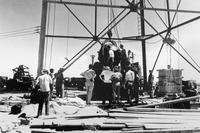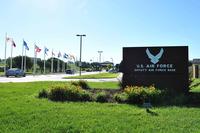LUKE AIR FORCE BASE, Ariz. — The 56th Fighter Wing chief of safety — a pilot attached to the 61st Fighter Squadron — made history here Feb. 2 as the first "Thunderbolt" to achieve 500 flight hours in an F-35 Lightning II.
Air Force Lt. Col. Matthew Hayden achieved the milestone flying his 270th sortie, a routine training mission.
"This is a testament to Luke and all the work we've done here to build up our experience and operations," Hayden said. "This is a reflection of our efforts to set up a high-quality training program for new pilots."
Hayden is one of the most experienced F-35 pilots in the world, and has flown and instructed new pilots at Luke since the program's inception.
"The [61st Fighter Squadron] 'Top Dogs' are incredibly lucky to have an F-35 instructor pilot who has been with the program since the beginning, flying with us on a daily basis," said Air Force Lt. Col. Aaron Jelinek, the squadron's director of operations.
"Lieutenant Colonel Hayden's depth of knowledge when it comes to both F-35 systems and tactics adds incredible value to squadron operations each and every day. This is an impressive milestone for Lieutenant Colonel Hayden as he continues leading the way when it comes to experience flying the F-35."
Significant Leap in Program's Progress
As Luke transitions from its mission of training F-16 Fighting Falcon pilots, maintainers and support specialists to training airmen in equivalent operation of the new F-35 platform, Hayden's 500th hour in the air marks a significant leap of progress in the development of Luke's F-35 program, Jelinek said.
"When our most experienced instructor pilot only has 500 hours in the plane, it goes to show the F-35 program is still young," he added. "However, it also shows that we are reaching a point where operations are normalizing, and we are able to transition our syllabus from training initial cadre to training less-experienced fighter pilots."
Luke airmen are among the first in a global generation of pilots to fly the F-35, and will continue to reach milestones such as this for the duration of the aircraft's development.
"The fabulous thing about this is that there are a lot of guys who are right behind me, who are really close to getting the same kind of milestone in their flying experience," Hayden said.
As today's pilots become more experienced with the F-35 platform, they position themselves to become the instructors and mentors of future generations of pilots flying more advanced versions of the fighter jet as they are developed and produced, he noted.
"As we build our cadre of instructors here, they'll be able to look back at their experience flying the airplane and have credibility and a solid background that they can use to teach their students," Hayden said.
Related video:
Bullet Points: F35 Lightning II


























